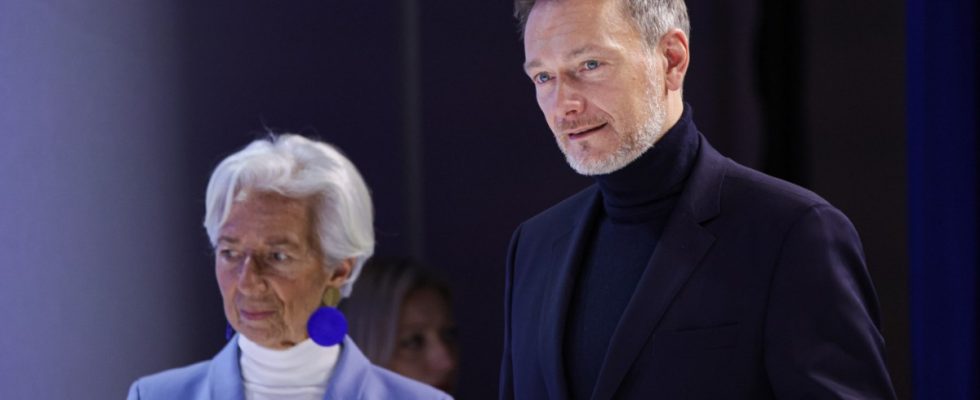There are still ten months until the US presidential elections. Will Donald Trump come back or will Joe Biden fend him off again? Finance Minister Christian Lindner (FDP) thinks the question is wrong. He sits on the final podium of the World Economic Forum, where the outlook for the global economy is being discussed. Whoever is President of the USA has global influence – but we have to free ourselves from that, he demands. “We talk too much about Donald Trump in Europe,” he says. The continent must do its homework. Europe’s defense and Europe’s economy must be set up in such a way that the continent can help itself and does not have to call for support, demands Lindner: “Then it doesn’t matter who the US administration is.”
Lindner received approval from the head of the European Central Bank (ECB), Christine Lagarde. She doesn’t comment directly on Donald Trump diplomatically, but responds directly to the German finance minister by saying: “Attack is the best defense. You have to be strong at home.” This includes improving the EU internal market. And above all, Europeans would have to invest their retirement savings in Europe so that the local economy could use this capital for investments. This requires a proper capital markets union, which Lindner agrees with. The European Union, he adds, should not freely distribute tax money to companies. “We can’t afford a subsidy race,” he says.
In Davos, the finance minister has to justify Germany’s poor economic performance; gross domestic product has recently fallen. “We don’t have the growth prospects that we expect,” admits Lindner. “But the economy has also shown resilience” in the face of increased energy prices and weak demand from China.
But Germany is not “the sick man of Europe,” says Lindner, but the German economy isn’t jumping out of bed fresh either: “Germany is the tired man after a short night.” The only thing that can help now is strong coffee, says the FDP party leader, and that means structural reforms. This refers to reforms that make it easier for companies to do business.
“We have 16 problems in Germany,” joked Lindner, “and the hot federal states”
The day before, on the sidelines of the World Economic Forum, Lindner tried to explain why some reforms have been delayed after two years of the traffic light coalition – with a federalism joke. He answered the question asked in English about why artificial intelligence wasn’t finally simplifying tax returns. Is there simply too much to do, what is known in English as “99 problems”? “We have 16 problems in Germany,” joked Lindner, “and the hot federal states.”
To combat climate change, he made a proposal on the stage of the World Economic Forum that could be well received in Davos and controversial in Germany. In Germany, it is “extremely expensive” to save future emissions, he says. Climate change is a global problem: “It doesn’t matter where CO₂ is emitted.” He therefore suggests an alternative. German steel manufacturers should therefore not build climate-neutral production with the help of subsidies, but should instead establish partnerships in Africa, for example – and finance CO₂ savings there. More could be achieved there with the same amount of money than in Germany.
Lindner suggests that world governments consider this idea the umbrella of the OECD should pursue. This is intended to create a global market for CO₂ – and the greenhouse gas could then be saved as efficiently as possible. A market-based solution that the audience at the World Economic Forum likes – but one that would produce winners and losers in Germany.

